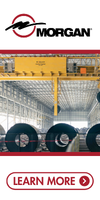New Year Brings New Tariff Quota System for EU Steel Imports
01/05/2022 - New import rules for EU-made steel took effect this week, capping shipments at 3.3 million metric tons before tariffs kick in.
The new tariff-rate quota (TRQ) system, which resulted from negotiations last year between EU leaders and the Biden administration, replaces a blanket 25% tariff on EU steel products. That tariff had been set under former President Donald Trump's Section 232 action on imported steel and aluminum in 2018.
The new quota applies only to steel products that are melted and poured within EU member nations. The U.S. also will renew for two calendar years exclusions that were granted to certain other EU-made steels that aren't available domestically.
Also as part of the agreement, the U.S. and EU have committed to annual reviews of existing trade measures, and to future cooperation on ways to curb global excess steel capacity and reduce carbon emissions.
In response to the news, American Iron & Steel Institute (AISI) president Kevin Dempsey issued a statement saying “AISI welcomes the president’s action to implement a TRQ under Section 232 on steel products imported from the EU in accordance with the agreement reached by the U.S. and EU last October. We are particularly gratified that the president’s proclamation emphasizes that only steel melted and poured in the EU will benefit from this alternative arrangement. Proper implementation and enforcement of the TRQ will be crucial to preventing another steel import surge that would undermine our industry and destroy good-paying American jobs.”
Philip K. Bell, president of the Steel Manufacturers Association, also issued a statement in praise of the trade measure. “This new agreement … emphasizes the importance of lowering carbon intensity in the global steel industry. This is an area where American steelmakers lead the way by producing the lowest carbon intensity steel in the world by being global leaders in recycling and electric furnace steel production. It is our sincere hope that this agreement will incentivize other countries to take a market-oriented approach to steel trade and sustainable steelmaking,” Bell said.



.jpg?lang=en-US&ext=.jpg)

